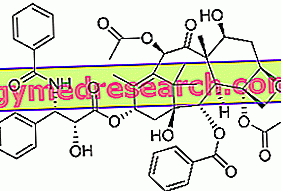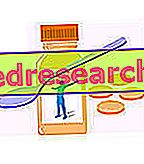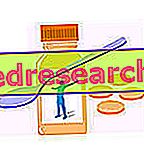Definition
Leukocytosis is a clinical condition characterized by the increase in leukocytes (white blood cells) in the blood compared to the average reference values; however, leukocytosis does not always hide a pathology. Since the white blood cells intervene in the defense mechanisms, the increase in the leukocyte count can in fact result in a temporary physiological condition, expression of an external attack in the organism.
Causes
The causes of the origin of leukocytosis can be summarized as: asthma, allergic attacks, cancer, tissue damage (eg burns), pain, taking medications for the treatment of depression, bacterial / viral / parasitic infections (especially pneumonia and varicella), inflammatory processes, leukemia (some variants), bone marrow diseases, emotional stress, autoimmune reactions, thrombocytopenia.
Symptoms
We talk about leukocytosis when the values of leukocytes in the blood exceed the threshold value of 10, 500 units per µl. The leukocytosis can trigger a different symptomatology depending on the severity, therefore of the triggering disease and the leukocyte count: most often the affected patient complains of arm pain, high fever, weakness, difficulty concentrating, vision disorders, lack of appetite, bruising, weight loss, bleeding, dizziness.
Information on Leukocytosis - Drugs for the Treatment of Leukocytosis is not intended to replace the direct relationship between health professional and patient. Always consult your doctor and / or specialist before taking Leukocytosis - Drugs for the Treatment of Leukocytosis.
drugs
Leukocytosis does not always require a specific pharmacological or medical treatment: often, as mentioned, the count of leukocytes in the blood increases following an insult to the organism, as a mechanism of self-defense. However, when the leukocytosis reflects a much more serious condition, the treatment becomes essential: the doctor, through an accurate diagnostic analysis, will identify the cause that arises at the origins of leukocytosis; consequently, the intervention will be subordinated to the triggering factor.
Here is an example: taking some medicinal specialties can promote an increase in blood leukocytes: in similar situations it is sufficient to stop the drug and, possibly, to replace it with another pharmacological specialty that has the same therapeutic effect.
Some patients with leukocytosis, on the other hand, need an intravenous infusion of fluids and electrolytes.
Below are summarized the most used drugs in therapy:
- Antibiotics: to remove the bacterium implicated in the infection, responsible, in turn, for altering the values of white blood cells in the blood.
- Antacids: indicated to reduce the acidity of urine during therapy for the treatment of leukocytosis
- Corticosteroids: therapy with steroid drugs is sometimes recommended due to their powerful anti-inflammatory effect. Remember, however, that a similar cure also helps to reduce the number of circulating leukocytes.
- Chemotherapy: some serious forms of leukocytosis are induced by leukemia, therefore, chemotherapy drugs are required to kill the diseased cells, favoring the restoration of normal levels of leukocytes in the blood (for further information: read the article on drugs for the leukemia cure)
Among the alternative therapeutic strategies to drugs, blood transfusion and bone marrow transplantation are the most accredited.
Antibiotic drugs for the treatment of bacterial-dependent infectious leukocytosis
- Penicillin or benzylpenicillin (eg Benzil B, Benzil P): to treat leukocytosis dependent on Streptococcus pyogene, it is recommended to take the drug at a dose of 2-8 million IU per day. The duration of therapy should be determined by the doctor.
- Moxifloxacin (eg. Vigamox, Avalox, Octegra): as an alternative to penicillin, to treat streptococcus pyogene-dependent leukocytosis, take 400 mg per day of medication.
- Cefotaxima (eg Cefotaxima, Aximad, Lirgosin, Lexor): the drug is a third-generation cephalosporin, indicated to treat infections caused by E. coli even in the context of leukocytosis. Indicatively, it is recommended to take 2 grams of active every 12 hours. It is recommended to combine therapy with a drug belonging to aminoglycosides (eg tobramycin, at a dose of 3-5 mg / kg per day, in three equally fractionated administrations, intravenously or intramuscularly).
- Erythromycin (eg Erythrocin, Erythro L, Lauromycin): is the drug of choice for the treatment of legionellosis: often, the disease also manifests itself with a modest or average leukocytosis, treated with 500 mg of drug, to be taken 4 times per day. The duration of therapy should be determined by the doctor.
Smoking cessation drugs
Smokers with leukocytosis should stop smoking: it seems that the high level of nicotine or catecholamines in the blood heavily affects the manifestation of neutrophil leukocytosis.
For further information: read the article on smoking cessation drugs
Steroid drugs for the treatment of severe leukocytosis
When the alteration of the leukocyte count is particularly important, it is necessary to take corticosteroids, very useful to restore the values of white blood cells in the blood.
The following are only some active ingredients and the most well-known specialties, without however describing the dosage, always established by the doctor according to the severity of the leukocytosis.
- Prednisone (eg. Deltacortene, Lodotra)
- Methylprednisolone (eg Advantan, Solu-medrol, depo-medrol, Medrol, Urbason)
- Cortisone (eg Cortis Acet, Cortone)
Antacid drugs for leukocytosis
These drugs are NOT used in therapy to normalize the plasma levels of leukocytes; more precisely, antacids are used to lighten the symptoms that arise from a specific therapy for the treatment of leukocytosis. Many drugs, in fact, tend to increase the acidity of the urine; to resolve this problem, it is recommended to administer antacid drugs.
- Sodium bicarbonate (eg citrosodina): this substance acts quickly neutralizing gastric acids, but has unpleasant side effects (alkalinization of urine, swelling, hypersodemia). Consult your doctor.
- Sodium citrate and potassium citrate (eg Biochetase): generally we recommend taking 3 g of drug dissolved in water, every two hours so that the urinary pH exceeds the value 7; the maintenance treatment consists in taking 5-10 g per day for a period of time established by the doctor.
- Aluminum hydroxide + magnesium hydroxide (eg maalox plus): take 2-4 tablets per day (500-1500 mg) with plenty of water, 20-60 minutes before meals and before bedtime.
- Magnesium hydroxide (eg magnesia): the drug, in addition to reducing the acidity induced by the cure for leukocytosis, is also recommended for the treatment of constipation.



